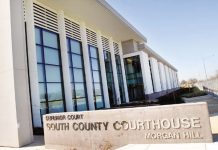MORGAN HILL
– After five years, six former Morgan Hill School District
students who accused the district of failing to protect them from
anti-gay harassment will have their day in court.
MORGAN HILL – After five years, six former Morgan Hill School District students who accused the district of failing to protect them from anti-gay harassment will have their day in court.
The students claimed they were physically and verbally harassed because their peers believed them to be gay, and teachers and the administration did nothing to protect them.
The Ninth Circuit U.S. Court of Appeals issued the decision Tuesday that is being proclaimed as historic by the American Civil Liberties Union, the group that brought the case along with the National Center for Lesbian Rights.
“This decision affirms that in the public schools, all students deserve the same protection from school authorities,” ACLU–NC staff attorney Ann Brick said.
The ruling allows the case to go to trial in federal district court.
Judge Mary M. Schroeder of the Ninth Circuit Court of Appeals in San Francisco agreed with a lower court that “there is sufficient evidence for a jury to conclude that the defendants intentionally discriminated against the plaintiffs in violation of the Equal Protection Clause.”
San Francisco-based ACLU attorney Matt Coles, who also is the director of the Lesbian and Gay Rights Project of the ACLU, described the decision as groundbreaking.
“In the past … schools had a responsibility to act once they know of violent harassment of an individual,” he said. “The district here said ‘some kids complained about some things, and when they complained, we reacted. You can’t call us to account if we didn’t know.’ The court said, ‘no, once you know about the problem (even if there has been no complaint) you must act.’ ”
The allegations behind six former Morgan Hill School District students suing the district for failing to protect them from anti-gay harassment are varied and occurred between 1991 and 1998, according to Tuesday’s published opinion of Schroeder.
The primary plaintiff is Alana Flores, accompanied in the lawsuit by four other young women and one young man.
According a deposition given by Flores and filed with the lawsuit, she frequently found pornographic pictures taped to her locker.
Once a note saying “Die, dyke b—–, f— off. We’ll kill you,” was attached to the photo. Flores said when she asked for help from Assistant Live Oak Principal Delia Schizzano, she was told “Yes, sure, sure, later. You need to go back to class. Don’t bring me this trash any more. This is disgusting.”
Schizzano asked Flores if she was gay. When Flores answered “no,” Schizzano asked, “Why are you crying then?” The student continued to receive notes and pictures and continued to bring them to Schizzano’s attention, but she contends school officials took no action.
The incident at Martin Murphy Middle School involves a male student who, according to published opinion, was beaten by six other students.
“Faggot, you don’t belong here,” he alleged he was told. The student was hospitalized with “severely bruised ribs.”
After he reported the incident to former Principal Don Schaefer and Assistant Principal Frank Nucci, “they punished only one of the six students … and (the student) was transferred to another school.”
Two other plaintiffs, while students at Live Oak, said other students made anti-gay comments and sexual gestures after the girls began dating during their senior year. The students allege that Bartschi told the girls to report the matter to campus police but did not follow up or investigate.
One student reported name calling and food throwing several times to a campus monitor. The report states that the monitor refused to act to stop the harassment even when she was a witness.
“On occasion,” the student alleges, “the monitor initiated a rumor among the students that (the student) and another female student were having oral sex in the bathroom.”
The student also alleges that a physical education teacher failed to take action when classmates said they didn’t want her to touch or look at them or to be their partner in class or when they called her “queer” and “dyke.” The teacher, the student alleged, suggested that she change clothes elsewhere so “her classmates would not feel uncomfortable.”
The original lawsuit, filed April 21, 1998, was supposed to go to trial in early 2000 when the district filed its first appeal. The plaintiffs asked for $1 million and that the district be forced to provide sufficient anti-gay harassment training and to respond appropriately and investigate complaints. The lawsuit, Flores v. Morgan Hill Unified School District, is named for plaintiff Alana Flores. All other plaintiffs are named only by initials because they were minors at the time the suit was filed.
The case was returned to U.S. District Court Judge James Ware, then appealed again. It is this second appeal that was decided this week. A case management hearing is scheduled for 10 a.m. April 28, during which Ware can set a trial date. A jury will hear the case if either side requests it.
San Jose attorney Matt Davis, who represents the school district, made it clear that there was no actual ruling (or decision) on the merits of the case.
“The court ruled that there was enough evidence to proceed to trial,” he said.
The case, from his point of view, hangs on three issues: Were the students harassed, were their complaints handled properly and, if they were not, then was that because of the nature of the claims (sexual orientation).
“Basically, it is up to the judge and/or jury to decide,” he said.
The Equal Protection Clause is a part of the 14th Amendment to the U.S. Constitution and was used in 1954 (the Brown v. the Board of Education decision) to declare racial segregation in the public schools violated the Constitution. Now, Coles said, it will protect all students in Morgan Hill, California and elsewhere in the Ninth District.
Coles said, in a narrow view, the court said school employees are not off the hook if the case goes to trial.
Coles explained why he thought the district appealed.
“Gee, it wasn’t clear that school administrators had a duty to protect kids from harassment,” he said. “The court said, ‘Yes, it is clear.’ ”
He explained that if a school district knows there is a problem with anti-gay attitudes, it has to protect the students.
“It can’t sit back and wait,” he said. “The district spent five years making sure there was no trial (by appealing twice).”
James Emery and Jill Ginstling of Keker & Van Nest in New York City argued the case for the students.
“The case is important because it is the first from the Ninth Circuit that tells school officials they have a duty under the Constitution to treat students the same. Officials have to protect students against peer harassment. If they (the school officials) know there is harassment, they have a duty to properly train their staff.
The defendants
Named in the case are district Superintendent Carolyn McKennan; Bob Davis, who was interim Live Oak principal; Delia Schizzano, assistant superintendent; Maxine Bartschi, assistant principal at Live Oak; Rick Gaston, assistant principal at Live Oak; Larry Carr, now a city councilman but then president of the school board; Susan Choi, Del Foster, Jan Masuda, Tom Kinoshita, John Kennett and Rick Herder, all school board members; former Principal Don Schaefer and former Assistant Principal Frank Nucci, both of Martin Murphy Middle School.
McKennan said she could not comment on the lawsuit or the judge’s opinion on advice of the district’s attorney.
“We are in litigation, and I am a named party,” she said to a series of questions.
McKennan also was instructed not to answer if the district would offer to settle out of court or if teachers and administrators are now being trained on how to handle incidents of harassment.
She couldn’t say how much the district had paid for legal services surrounding the case because the matter is handled with “a consortium of other schools” involving insurance.
School board president Tom Kinoshita also would not comment on the case.
A phone request to speak with the former students was not returned.
Any changes at Live Oak?
Melissa Ballard, president of the Gay-Straight Alliance at Live Oak, said things are a bit different now at the high school.
“There aren’t a lot of problems,” she said. “The gay people I know keep to themselves. They don’t make a big deal about it (the occasional name calling). It’s there but they don’t talk about it.”
Ballard also said she doesn’t really remember having organized training against harassment at Live Oak.
“I do remember being told about it when I was in Catholic school,” she said.
Long-time Live Oak English teacher Aaron Spain has seen it all.
“I suppose you can say that change has occurred because of the heightened tension associated with these kinds of issues,” he said. Spain said he thinks the Alliance has a lower profile than in past years.
“They may not feel the need to be out there,” he said. Spain said that teachers are given a little sensitivity training – a brief overview on the legalities.
“They are told that harassment won’t be tolerated,” Davis said, “and if there is a complaint, that complaint will be investigated.”
The district policy, he said, bans all forms of harassment, including that which is sexual or racial.
“It is frustrating because Judge Ware originally agreed (with the district) that there was no clearly established … and granted qualified immunity,” he said. “It was when Ware withdrew the immunity that we appealed.”
Judge Schroeder’s ruling can be read in full on the court’s Web site www.ce9.uscourts.gov.













